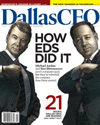Globalization. Outsourcing. Offshoring. Flat organizations. New York Times columnist Thomas Friedman explored these themes and their consequences for America in his best-selling book, The World is Flat. What do these trends mean for Dallas? More specifically, what are the consequences of these forces on the Dallas business community and our civic institutions?
Dallas has changed dramatically from the days when a small group of business leaders set the vision for the city and made sure that critical social, cultural, and economic institutions and projects received the support they needed. That structure was destined to change, and it has. Since then, several leading companies have relocated to the suburbs, most financial institutions are no longer locally owned, and the demanding nature of today’s business environment makes it difficult for executives to commit time to civic involvement.
Simultaneously, economic power in Dallas has dispersed. Government agencies, nonprofit organizations, and small businesses are responsible for a larger share of the region’s job creation and investment. Minority- and women-owned businesses are increasingly successful and organized. The geographical perception of Dallas has expanded from the boundaries of a city to a multi-county metropolis that is larger than some states.
In this much more decentralized, even confusing environment, numerous individuals, companies, and business organizations are expending substantial energy and resources on issues such as education, transportation, public safety, and economic development. Their efforts are offered in the best spirit of public service and Dallas is progressing on several fronts, but there is no process to consistently organize those efforts toward measurable outcomes. In areas that define the quality of urban life and our future competitiveness, this scattered approach—however well-intentioned—is not delivering the results Dallas needs. Limited gains in improving student achievement, reducing crime, increasing economic opportunity in the southern sector, and decreasing highway congestion are just a few areas where it’s become obvious that Dallas needs a more accelerated and dynamic process to meet our challenges.
In Dallas today we have the remnants of an industrial era form of business engagement, but we are entering the second or third stage of the information-driven world. Leaders of Dallas companies need to start thinking of themselves as purchasers of measurable civic outcomes because indeed the community is a factor in the success or failure of all of our companies. Much like we would evaluate any business investment, we need to consider alternative, nimble frameworks for assembling the leadership and resources necessary to achieve results. We must have greater focus and accountability, and a ruthless elimination of duplication and waste across the organizations and causes that we fund. In the process, Dallas has the opportunity to develop its next generation of business leaders.
The most successful cities of the world will be those that consistently construct diverse coalitions of business, government, nonprofit, and individual leaders that are focused on achieving specific measurable outcomes. The cycle time to achieve return on civic investment must be compressed and the cost of achieving results low. The framework to manage this new model of civic engagement must be inclusive so as to draw on the full range of diverse talent and creative thinking that exists in the Dallas business community. It comes down to a strategic rethinking of the funding, governance, and priorities of those organizations that represent Dallas business.
In the coming months this column will explore the concept of “purchasing civic outcomes.” There are alternative models emerging in Dallas and best practices from other cities to consider.
In the flat world presented to us in Friedman’s book, Dallas must move faster and more efficiently than our competition. Dallas business leaders have a history of rising to challenges and now the task of deciding how to manage our civic responsibilities is squarely in front of us.
Phil Ritter is a senior vice president for Texas Instruments Incorporated. In addition to overseeing TI’s public affairs, Ritter is a trustee of the TI Foundation and serves as chairman of the company’s Constructive Citizenship Program. A board member of the World Affairs Council of Dallas and the Texas Taxpayers and Research Association, he considered a run for mayoral office in the upcoming election.





